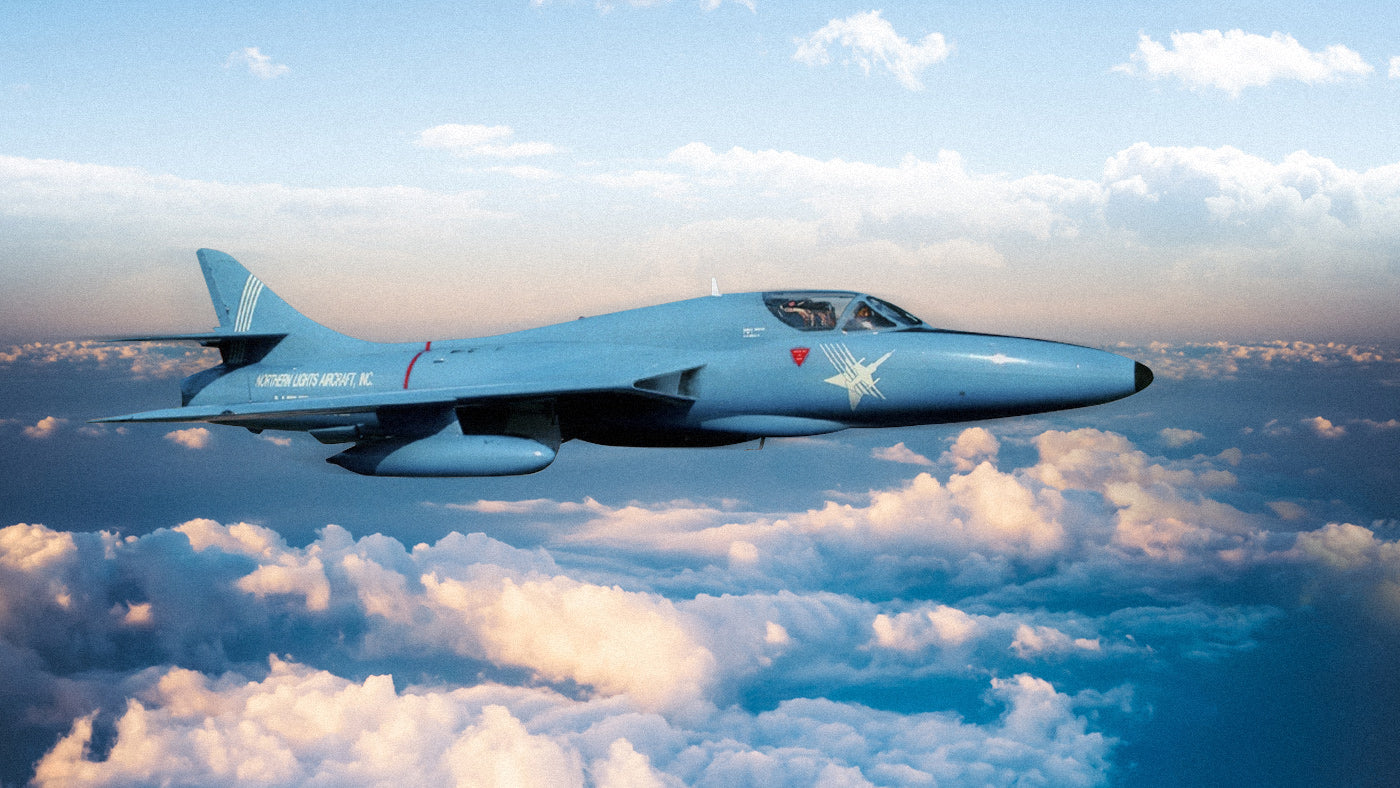
- by Dianna Lopez
Hawker Hunter T7: A Sleek and Agile Trainer
- by Dianna Lopez
A question? Visit our contact page
This site uses cookies for better user experience and analytics.

Step back in time as we delve into the history of an aviation great - the Hawker Hunter T7, a legendary aircraft that left an indelible mark on the skies. Read about N576NL, a distinguished Hawker Hunter T7, whose journey took it from the United Kingdom to the United States, from Yanks Air Museum to MotoArt, preserving the legacy of this remarkable plane as PlaneTags.
The Hawker Hunter T7 is a dual-seat training aircraft derived from the acclaimed Hawker Hunter fighter jet. Developed primarily for instructional purposes, this variant features a tandem cockpit layout, facilitating the training of pilots under the guidance of an instructor.
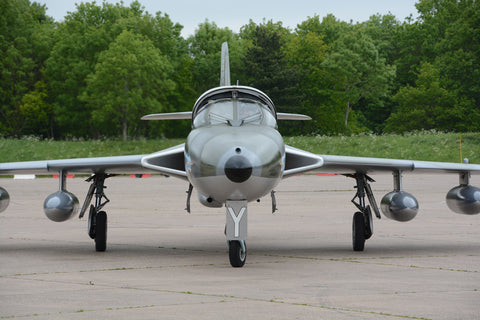
Photo by Richard E. Flagg, UKAirfields. Used with permission.
Powered by a Rolls-Royce Avon turbojet engine, the T7 inherits the robust performance characteristics of its single-seat counterpart. Its design, characterized by sleek aerodynamics and advanced engineering, enables effective training in handling jet-powered aircraft and mastering complex aerial maneuvers.
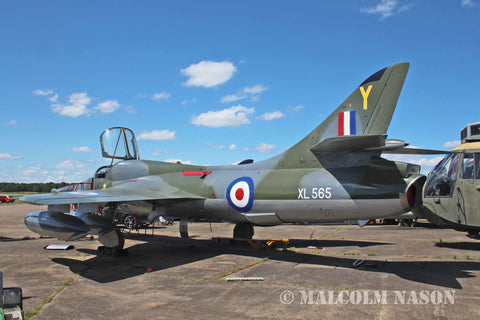
Photo by Malcolm Nason, used with permission.
Originally commissioned by the Royal Air Force (RAF), the Hawker Hunter T7 found widespread adoption in various air forces globally. Notable deployments include service with the RAF as well as in nations such as Switzerland, Sweden, and Singapore.

While serving as a vital platform for pilot training throughout the Cold War era, the Hawker Hunter T7 eventually faced obsolescence with the advent of more modern training aircraft. As a result, many units were retired from active duty, finding secondary roles in museums or private collections, serving as a testament to its historical significance and enduring legacy in military aviation.
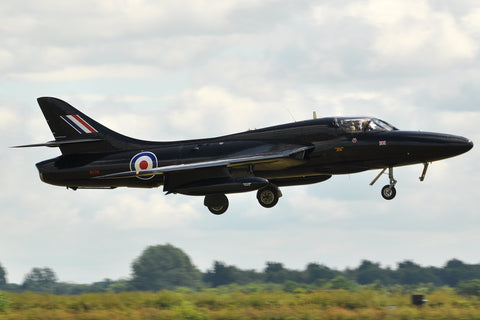
Photo by Richard E. Flagg, UKAirfields. Used with permission.
In the aftermath of World War II there was a shift towards jet propulsion technology in military aviation, and the British Royal Air Force (RAF) sought a new high-performance jet fighter to replace its aging fleet.
In the late 1940s Sydney Camm, the renowned chief designer at Hawker Aircraft, began working on what would become one of the most iconic British fighters of its time. Drawing inspiration from previous Hawker designs and incorporating the latest advancements in aerodynamics and jet engine technology, Camm and his team set out to create a versatile, agile, and fast aircraft capable of outperforming contemporary adversaries.
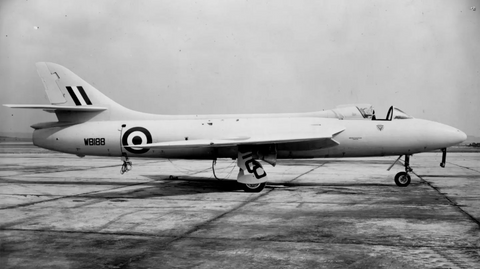
The prototype Hawker Hunter, called the P.1067, first took to the skies on July 20, 1951, powered by the Rolls-Royce Avon turbojet engine. Its sleek design featured swept wings and a distinctive tail configuration, both functional and elegant. Initial flight tests proved promising, and the Hunter soon entered production as the Mk 1 variant, equipped with Hispano Mk. V 20mm cannons and capable of reaching speeds exceeding Mach 0.9.
Throughout the 1950s and 1960s, the Hawker Hunter underwent continuous development and improvement, resulting in numerous variants tailored for various roles, including fighter-interceptor, ground attack, reconnaissance, and training. Its versatility and adaptability made it a popular choice among not only RAF but also numerous other air forces worldwide.
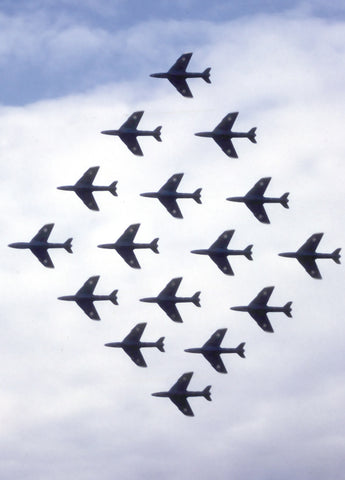
Photo by Arpingstone - Own work, Public Domain
The Hawker Hunter's combat prowess was demonstrated in conflicts such as the Suez Crisis, the Indo-Pakistani wars, and various colonial conflicts. Its exceptional agility and performance also contributed to its success as a display aircraft in aerobatic teams, most notably the RAF's prestigious Black Arrows.

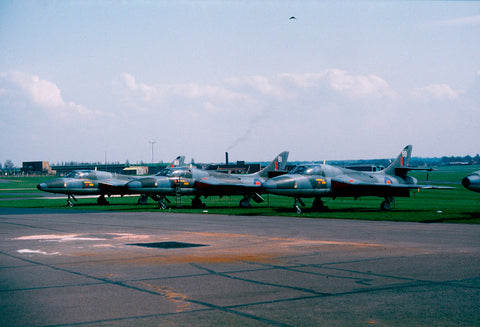
Hawker Hunter T7s RAF 2nd School of Technical Training at RAF Cosford, taken April 3, 1988 by Philip Hancock, used with permission. Pictured are XL617/89, XL576/81, XL572/83
Our Hawker Hunter T7 was delivered to the RAF as XL576 on July 25, 1958. Sometime before 1988, it was assigned to Number 2 School of Technical Training at RAF Cosford, with the serial 8835M RAF, where it was used as an instructional airframe. In 1989, after its career with the RAF ended, it was given the registration N576NL and began the next stage of its life in the United States. It was utilized under military contracts with Northern Lights Aircraft Inc. and Advanced Training Systems Int. Like many post-RAF T7s, N576NL provided a cost-effective way to provide realistic combat training exercises.
On November 17, 1999, N576NL experienced a loss of power during a takeoff at Phoenix–Mesa Gateway Airport (formerly Williams Gateway Airport and Williams Air Force Base), resulting in a collision and complete write off. Yanks Air Museum obtained the damaged cockpit and provided the original skin to MotoArt for PlaneTags.


"Working with Yanks Air Museum has been an enjoyable experience of meeting the family who make this incredible museum possible," says MotoArt PlaneTags owner Dave Hall. "When I first saw the Hunter and was offered to preserve the memory of the aircraft in exchange for helping move the derelict airframe, it was the perfect deal! It's a great edition to the Hawker PlaneTags series. It was fun to discover the history of this very cool aircraft."

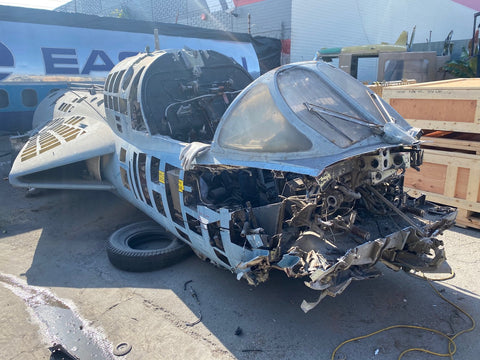
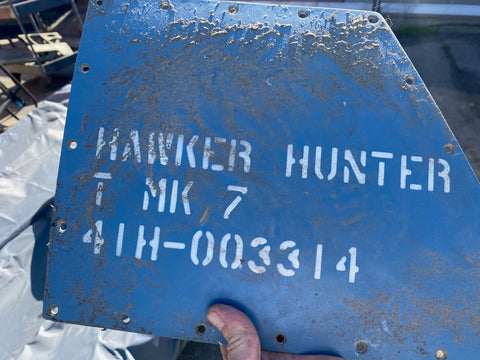
Yanks Air Museum, located in Chino, California, boasts one of the most impressive, and largest aircraft collections in the world. Many of them are airworthy, and several are the only remaining examples of their kind. Since their first acquisition of a Beech Staggerwing in 1973, their collection has grown to more than 200 aircraft. Yanks and MotoArt have teamed up on many occasions to create PlaneTags from some of the most iconic military aircraft, including the Sikorsky HH-3 and Douglas A-4 Skyhawk.
Hawker Hunter T7 PlaneTags will be available beginning at 12 PM noon PDT on Thursday, March 14, 2024 at planetags.com. Secure your piece of RAF history - don’t miss this opportunity to add Hawker Hunter PlaneTags to your fleet.
From Warbird to Water Bomber: The Epic Life of the Hawaii Mars
In the world of aviation, few aircraft have lived a life as large, or as long, as the Hawaii Mars. Towering over most of its contemporaries with a wingspan of 200 feet, this mighty flying boat was born in the final days of World War II, then quietly transformed into one of the most iconic aerial firefighting aircraft the world has ever seen. From military transport to firefighting titan, the Hawaii Mars represents one of aviation’s most extraordinary second acts.
In 2025, MotoArt obtained an original wing of this aircraft and created special PlaneTags, made exclusively for the Martin family members and Mars workers. On December 11, 2025, Hawaii Mars PlaneTags will be available to the general public for the first time.
F-14 Tomcat Coasters: A Legendary Fighter Reimagined for Your Home
Few aircraft define an era quite like the Grumman F-14 Tomcat. Sleek, powerful, and unmistakably iconic, the Tomcat was the Navy’s premier fleet defense fighter for more than three decades. From Cold War missions to pop culture stardom, the F-14 remains one of the most recognizable and beloved aircraft ever built. Today, MotoArt is proud to introduce the F-14 Tomcat Coaster Set, created from authentic F-14 aircraft material.
PR-AJB: The Story of an Azul Airbus A320 With a Global Journey
Every airplane has a story, and some travel farther than others before their flying days are over. PR-AJB was one of those well-traveled aircraft. This Airbus A320 started its life flying British families on long-awaited holidays, then later crossed the Atlantic to join the growing fleet of Azul Linhas Aéreas Brasileiras. Over nearly nineteen years it picked up new registrations, new paint, new routes and a new home, carrying thousands of passengers along the way.
Its journey reflects how widely the A320 family has spread around the world and how easily these aircraft adapt to whatever their next chapter requires. PR-AJB also arrived at Azul during an important period of expansion as the airline worked to connect more cities across Brazil. In this blog we will explore where the aircraft came from, what it did during its short time with Azul, and how it eventually came to rest in Florida. We will also share how MotoArt recovered material from the retired airframe and created PlaneTags so its story can continue in a new way.


Share:
United Airlines 727: An Icon of the Skies
From Delta Air Lines to Your Collection: Boeing 717 PlaneTags